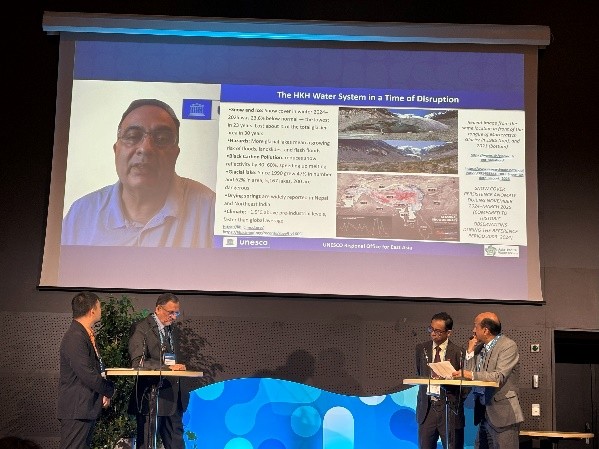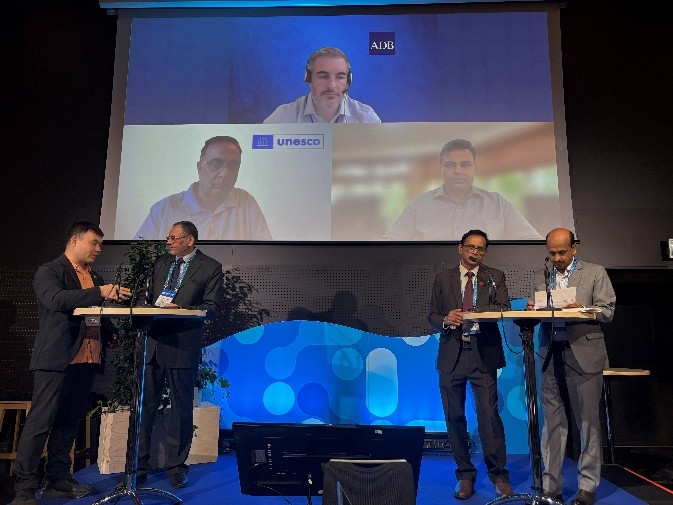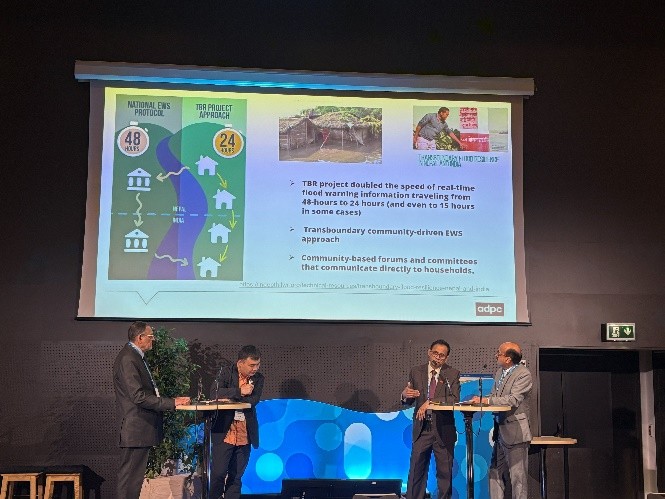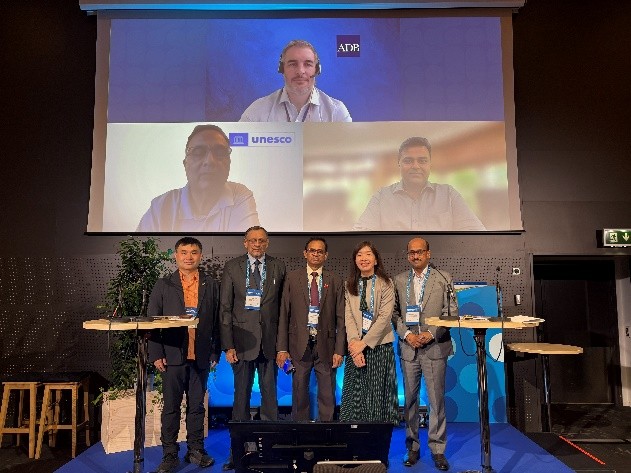Session Outcome Report: Stockholm World Water Week 2025, Asia-Pacific Focus—Building a Climate-Resilient Hindu Kush Himalaya (HKH)
Date: 27 August 2025 9:00-10:30 CEST
Co-Convenors: APWF, ADB, ADPC, ICIMOD, IUCN Asia, IWMI
The recording is available via YouTube:
|
Panelists ・ADB: Mr.Declan F. Magee, Principal Economist, Climate Change and Sustainable Development, ADB |
Session Opening
Ms. Yumiko Asayama, Chief Manager, APWF Secretariat/ Japan Water Forum, opened the session by underscoring that the Hindu Kush Himalaya—known as the “Third Pole”—is both a critical water source and one of the most vulnerable regions in the world. Rapid glacial melt, shifting hydrology, and intensifying disasters threaten the livelihoods of nearly two billion people downstream. She emphasized that no country can tackle these interconnected challenges alone, calling for stronger regional cooperation and the promotion of science diplomacy. The session, she noted, aims to advance collaboration among science, policy, and practice to strengthen data sharing, scale up nature-based and community-led solutions, and mobilize finance for climate-resilient action. Building resilience in the HKH, she concluded, will require solidarity, innovation, and trust across each river basin and the countries of the HKH.
Keynote Presentation – Setting the Scene
Prof. Shahbaz Khan, Vice Governing Chair, Asia-Pacific Water Forum (APWF) and Director and Representative, UNESCO Regional Office for East Asia, delivered a setting the scene presentation, drawing on the collective resources and inputs of all co-convening organizations.
He underscored the urgency of regional cooperation in the HKH, where melting glaciers and shifting hydrological cycles are already disrupting water, food, and energy security. Prof. Khan called for open science, inclusive data sharing, and partnerships that combine indigenous knowledge, AI, and advanced hydrological modeling to enhance basin management and early warning systems. He urged all stakeholders—governments, regional platforms, UN agencies, and youth—to collaborate through joint monitoring and open data initiatives to foster shared accountability and trust.

Screen: Prof. Shahbaz Khan (Vice Governing Chair, Asia-Pacific Water Forum (APWF) and Director and Representative, UNESCO Regional Office for East Asia)
Speakers’ Highlights
Dr. Qianggong Zhang, Senior Climate Change and Environment Specialist, ICIMOD
・Presented ICIMOD’s role as a regional science and knowledge platform, serving eight member countries and supporting the ten major rivers originating in the HKH.
・Highlighted the growing crisis of “too much or too little water,” driven by climate change and affecting agriculture, livelihoods, and economies.
・Showcased multi-level actions—community-based early warning systems, policy-support tools, regional dialogues, and global advocacy—to ensure mountain voices are represented in decision-making.
・Noted progress under HIMAP, HI-WAYS, and thematic hubs on disaster risk reduction and cryosphere monitoring, advancing regional cooperation and data sharing.
・Through its Regional Task Force, ICIMOD connects science, policy, and investment to build trust and collective action for transboundary water management and resilience.
Dr. Senaka Basnayake, Program Lead, Climate Services, ADPC
・Presented the Transboundary Flood Resilience Project (2017–2018)implemented with Lutheran World Relief Nepal and funded by the Global Resilience Partnership.
・Building on lessons from the 2008 Koshi flood, the project enhanced EWS across Nepal and India’s Koshi and Gandaki basins, directly linking upstream and downstream communities.
・Reduced communication time from 48 to 24 hours through citizen forums, local monitoring tools, and SMS-based alerts.
・Policy dialogues in Kathmandu and Delhi produced ten key recommendations, including improved SOPs, stronger inter-agency coordination, and institutionalization of Transboundary Citizens Forums.
Dr. Alok Sikka, Country Representative for India and Bangladesh, IWMI
・Emphasized integrated water management across the Himalayan region, noting that upstream rainfall and glacier melt significantly affect downstream areas like Bihar.
・Highlighted IWMI’s initiatives:
- Water accounting and hydrological modeling
- Index-based flood insurance and drought monitoring through the South Asia Drought Monitoring System
- The Integrate Project, developing a Catchment Resilience Index
- Rainwater harvesting, spring rejuvenation, and solar irrigation to improve supply and demand management
・Through the Indus Knowledge Forum and science–policy dialogues, IWMI promotes a nexus approach linking water, energy, food, and ecosystems to strengthen regional resilience.
Dr. Vishwa Ranjan Sinha, Senior Programme Officer, IUCN Asia
・Stressed the role of nature-based solutions (NbS) and youth engagement in enhancing regional synergies.
・Noted that the HKH region contains four of the world’s 35 biodiversity hotspots, with 85% of the population directly dependent on nature and more than 70 million under age 35.
・Highlighted results from an IUCN survey in India, Bangladesh, Pakistan, and Nepal, revealing institutional and financing barriers to NbS implementation.
・Called for integrating NbS into national adaptation plans and for empowering youth as catalysts for innovation and cooperation.
Mr. Declan F. Magee, Principal Economist, ADB
・Focused on the financial and operational dimensions of addressing glacier loss and water challenges.
・Noted that 2025, the International Year of Glacier Preservation, underscores the urgency of action.
・Emphasized the need to mobilize significant financial resources for investments in sustainable agriculture, resilient infrastructure, and climate-proofed development pathways.
・Highlighted ADB’s efforts, including partnerships such as the Glacier to Farms initiative with the Green Climate Fund (GCF).
・Stressed that finance alone is insufficient—there must also be a pipeline of investable projects grounded in sound science and policy collaboration.
・Urged stronger cooperation among scientists, policymakers, and financiers to connect science-based evidence with implementable investment strategies.


Confluence Video Introduction – “Indus River Story”
Before the interactive panel, ICIMOD introduced the Confluence Video Series, beginning with “The Indus Story.” This documentary follows glacier-fed rivers from their icy origins to the bustling communities downstream, blending science and storytelling to convey the profound connection between water and the region. The film highlights both the shared fragility and collective hope of HKH communities, underscoring the power of collaboration and shared stewardship.
Interactive Panel Discussion: Bridging Science, Policy, and Action
Moderators:
・Dr. Faisal Mueen Qamer, Intervention Manager, Resilient River Basins (onsite)
・Prof. Shahbaz Khan, APWF/UNESCO (online)
Panel Question 1 – Where are the barriers between science and policy?
・Prof. Khan noted that despite decades of robust research on water, climate, and ecosystems, translating knowledge into policy and action remains challenging due to institutional and political barriers.
・Dr. Alok Sikka (IWMI India):
- Highlighted the difficulty of scaling local research outcomes to national policy.
- Called for “research for development”—applied, solution-oriented studies aligned with policy needs.
- Emphasized the need to bridge narrow research perspectives with policymakers’ systems-based approaches.
・Dr. Vishwa Ranjan Sinha (IUCN Asia):
- Agreed that research is often too academic and disconnected from real-world application.
- Stressed understanding stakeholder trade-offs and fostering shared basin-level visions to sustain cooperation.
Panel Question 2 – Integrating Glacial and Watershed Models into Policy
・Dr. Chang Zhang (ICIMOD):
- Highlighted 2025 as the International Year of Glacier Preservation and the start of the Decade of Action for Cryosphere Science.
- Emphasized ICIMOD’s 40-year experience in cryosphere research and policy engagement.
- Called for continuous updates to scientific knowledge, stronger collaboration, and institutional platforms to accelerate science-to-policy translation.
・Dr. Alok Sikka:
- Noted that hydrological modeling must move beyond data generation to provide actionable policy and basin management insights.
Panel Question 3 – Nature-Based Solutions for Transboundary Risk Reduction
・Dr. Senaka Basnayake (ADPC):
- Described NbS as cost-effective, cooperative approaches benefiting both upstream and downstream communities.
- Highlighted forest, wetland, and floodplain restoration to reduce flood and erosion risks.
- Noted that NbS fosters trust, joint monitoring, and data sharing among riparian countries and can complement or substitute hard infrastructure.
Audience Interaction- Key Questions Raised:
1.How can traditional wisdom be integrated with scientific models when community experience diverges from scientific findings?
2.Why do disaster losses persist despite multiple early warning systems?
3.What strategies effectively ensure that research informs policy, and what lessons can be drawn for other regions such as West Africa?
Response (Dr. Vishwa Ranjan Sinha, IUCN Asia):
・Emphasized intergenerational dialogue to bridge traditional knowledge and modern science. Recommended regional forums, conservation platforms, and co-creation of knowledge to strengthen collaboration between youth, practitioners, and experts.
(Due to time constraints, questions 2 and 3 were not addressed.)
Closing Remarks – Prof. Shahbaz Khan
・Glacier and watershed management challenges are not merely technical but intensely human, with direct implications for livelihoods, peace, and regional stability.
・Urged participants to commit to collective, inclusive, and evidence-based action linking science, policy, finance, and communities to build a climate-resilient Hindu Kush Himalaya.

Group photo of the members (the author is second from the right on the stage)
(Reported by Yumiko Asayama, Chief Manager)
